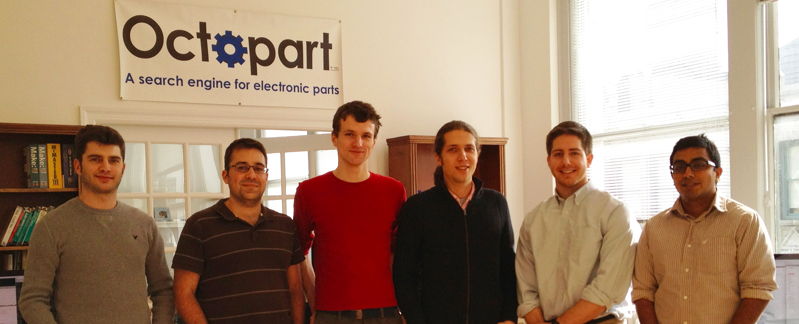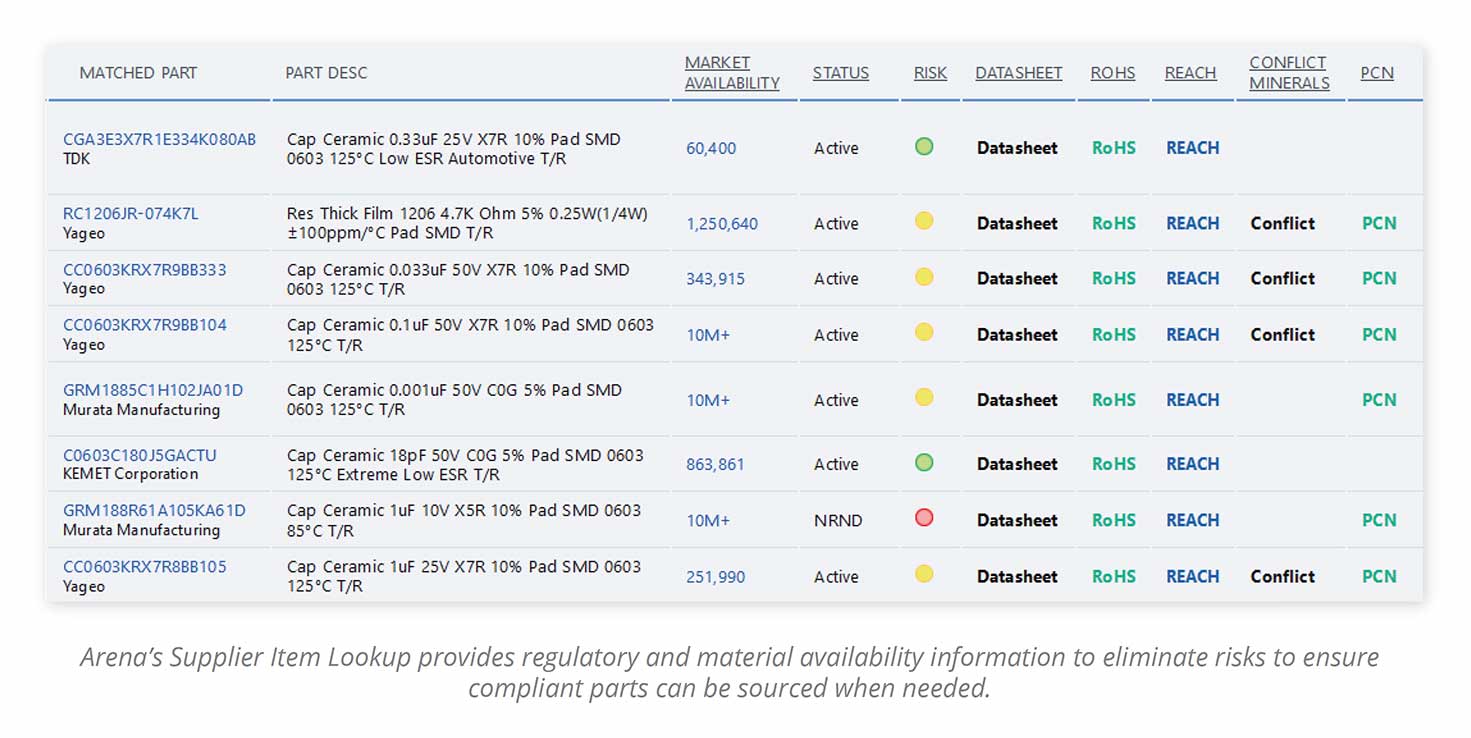A look inside Octopart—the Google for electronic components

The Octopart Team: (from left) Jacob Ribnik, Andres Morey, Bryan Newbold, Sam Wurzel, Christopher Calvi, Harish Agarwal
Andres Morey and Samuel Wurzel are changing the way you shop for electronic parts.
Andres and Sam, who studied physics together at Brown, then pursued PhDs in astroparticle physics and plasma physics respectively, are the founders of Octopart—a Google-esque search engine for electronic parts.
Octopart makes it easy to compare the prices and availability of electronic components across a wide variety of distributors, all in one place. You can use Octopart to search for parts by name and number, or navigate through a taxonomy of structured items. For every part on the site, Octopart provides a variety of distributors for every part, as well as prices and links to buy. The site has been live since 2007, and gets over 700,000 unique visitors per month.
We recently partnered with Octopart to create the Autofill functionality for Arena PartsList—a new application that automates electronic component evaluation and documentation—so I took some time to talk with Andres and Sam about the past, present and future of Octopart, and what it takes to grow a successful company.
Alex: How did you come up with the idea for Octopart?
(Andres) We developed the concept for Octopart when we were both in grad school working on some hardware projects. Sam was working on a fusion reactor—
(Sam) Let me jump in here, it was an experiment related to nuclear fusion energy, I wasn’t building an actual reactor.
(Andres) Right.
(Sam) And while I was doing that, Andres was working on some really wild experiment where they were building a particle detector at the South Pole.

(Andres) So at that time, we were both working on hardware projects with very demanding tolerances. As we were going through the process, we discovered it was really hard to get the components we needed.
While I spent weeks looking for capacitors that could be embedded in the ice of the South Pole, Sam was tearing his hair out trying to find amplifiers with really high frequency requirements.
(Sam) We found ourselves really struggling to find the parts we were looking for, and ended up spending a lot of our time pouring over catalogs. We were getting really frustrated, but then we realized that all of our coworkers were doing the same thing.
As it became clear that component shopping was a universal problem, we thought, “Maybe there is an opportunity to do something for all the people that have this problem.”
(Andres) From there, we started brainstorming all the different things we could do. We both loved coding, so the idea of a website made a lot of sense.
As soon as we had something ready we threw it up on the web and sent out an email to our friends for feedback. We applied for Y Combinator funding a few months later and launched formally a few months after that in March 2007.
Alex: How did two physics majors create a successful software startup? What’s your secret?
(Sam) In some ways, startups are remarkably simple. It comes down to what Y Combinator says over and over—“Make something people want.”
(Andres) That’s right, there really is no secret to starting up a company. Step one—Make something people want, and Step two—Don’t run out of money before you achieve Step one.
(Sam) If you do those two things, you’re going to be successful. It’s a simple formula, but for something so simple, it can be really hard to do. We’ve been working on Octopart seven days a week for over five years now, and there’s always more to do.
(Andres) We also had a lot of help from some really amazing people. A friend of mine from grad school, Harish, joined us the day we launched and there’s no way we could have grown the company without him. Most recently we convinced a couple of really smart people to join us. Bryan and Chris have already made a tremendous impact and I can’t imagine the company without them.
Alex: When launching a company off the ground, how important is experience?
(Sam) I don’t think business experience is as important as you might think. We had physics backgrounds but we didn’t have any business or industry experience. We were able to pick up the business side of things as we went along. But without a physics background, picking up the technical aspects would have been much more difficult.
(Andres) I would even say that in some ways, our naivety helped us, because we were so optimistic. We had no idea how many challenges there would be, so we went into the whole thing very optimistically and with a lot of energy. I think this was helpful when we ran into those coding and business challenges, because we just worked through them.
Alex: What are some of the challenges you faced while trying to get Octopart off the ground?
(Sam) Jumping into an industry where we had no contacts and no experience was a challenge. Building relationships and learning the ins and outs of the electronic component industry took a long time.
(Andres) Things take longer than you anticipate. Like many people who love their idea, we thought that if we could get the data and site together, we would have the world at our doorstep right away. In reality, it took quite a lot of time to build relationships in the industry and develop our user base.
We faced a whole other set of challenges when it was time to scale—both on the software side and on the organizational side. On the product side, when you have a part database of 15 million, you’re constantly working to make sure it’s accessible and scalable. And on the organizational side, anytime you grow, there are more people and personalities that you have to bring together around the common goal, which can be tough.
(Sam) Over the last year or so, we’ve played around with a lot of ways to organize and manage responsibilities. Whether you’re talking about scaling a product or scaling a company, experimentation is a big part of it. You circle around to find out what’s not working, and keep iterating.
Alex: How do you see Octopart evolving? Where would you like to take the site from here?
(Sam) A year from now, we want to be a couple of different things. First off, we really want to improve the quality of the data on the site—a lot of that is dependent on developing business relationships to gather that information.
We also are really focused on increasing our industry penetration, and syncing Octopart up with as many manufacturers as possible. When it comes to securing all different kinds of part information, we really see partnerships as a great place to grow the business.
(Andres) I would definitely say the future is growth. We’ve doubled the size of the company in the last 6 months, and are increasing our efforts to improve and increase the site’s information.
On one hand, that means working with our current partners to index their component info on the site, and add updated data sheets, etc, but like Sam said, we also want to increase the amount of manufacturers and distributors we work with to get critical part information.
Currently, we’re looking for really good developers, and people who are passionate about electronics. We need people to talk to and work with the manufacturers of electronic parts so we can increase the amount of content on the site.
Alex: What’s it like to work at Octopart?
(Sam) I think it’s great. We work really hard, but also have a great sense of camaraderie and teamwork, and we all really believe in the project.
(Andres) In general, I would say Octopart is a great place to work because we’re always trying to improve our product, and are extremely open to innovation.
All of us are really passionate about electronics and coding, and most of us were hardware hackers before working at Octopart. Lately we’ve been trying to make room for side projects to keep in touch with our hardware roots.
Octopart discusses the future of component shopping
In addition to learning more about Octopart’s mission to improve part shopping, I also picked Sam and Andres’ brains about the future of component shopping, PartsList, and the likelihood of a one-stop component shopping experience. Check back next week to learn why one-stop component shopping may just be a pipe dream.
If you’re interested in pairing product lifecycle management (PLM) or quality management system (QMS) software solutions with Octopart, look no further. Arena provides a simple integration with Arena Supplier Item Lookup for Octopart to help you get the most from your product development system.



